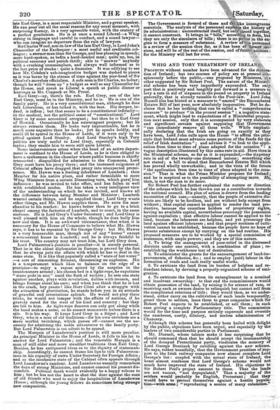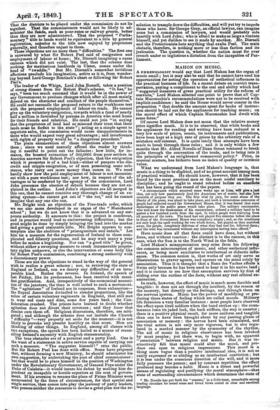WHIG AND TORY TREATMENT OF IRELAND.
PROJECTS without number have been advanced for the restora- tion of Ireland; but two courses of policy are at present t6dia- spicuously before the public,—one proposed by Ministers, t' e other suggested by Sir Robert Peel. The nature of the Minist rial scheme has been very imperfectly expounded. The only part that is positively and tangibly put forward is a measure to levy a rate in aid of sixpence in the pound on property in Ireland generally, that is already rateable to the Poor-law. Lord John Russell also has hinted at a measure to "amend" the Encumbered Estates Bill of last year, now absolutely inoperative. But he de- clares that he has nothing that can be called a " comprehensive measure" to produce "in the present session" : a negative state- ment, which might lead to expectations of a Ministerial proposi- tion next session, only that it is accompanied by very elaborate and significant caveats against supposing that Government "can immediately remove all these evils.' While emphati- cally declaring that the Irish are going on exactly as they have been, Lord John calls upon the House "to affirm the prin- ciple that Ireland must advance some portion of the funds for the relief of Irish destitution" ; and advises it " to look to the appli- cation from time to time of plans adapted for the occasion": a vague description illustrated by this same rate in aid. Here then is the Ministerial scheme, so far as it is expounded,—the sixpenny rate in aid of the twenty-one distressed unions; something else not stated ; a bill to mend that Encumbered Estates Bill which has proved wholly unworkable; and in the vista of the future " the application from time to time of plans adapted to the occa- sion." That is what the Prime Minister proposes for Ireland ; and he is sceptical as to the possibility of attempting mere. He, then, is not the man to do more.
Sir Robert Peel has further explained the nature or direction of the scheme which he has thrown out as a contribution towards the national council. His plan of action is drawn from the leading necessities of the case,—namely, that the people of extensive dis- tricts are likely to be foodless, and are without help except from without ; that capital cannot be applied to render the land pro- ductive, because the countless holders of proprietary rights, having no available capital, nevertheless preoccupy the possession against capitalists ; that effective labour cannot be applied to the land, because the labourers are helpless, and yet preoccupy the land against efficient labourers ; and that proper routines of culti- vation cannot be established, because the people have no hope of present subsistence except by carrying on the bad routine. His proposed measures are to be worked by a special commission of statesmen, with ample powers ; and they are of this nature.
1. To bring the management of poor-relief in the distressed districts under one control, with a combination of plans ; re- establishing the workhouse test of destitution. 2. To administer the grants for the encouragement of land-im- provements, of fisheries, &c.; and to employ (paid) labour in the formation of roads and such really useful works. 3. To extricate the land from its burden of helpless and re- dundant labour, by devising a properly-organized scheme of emi- gration.
4. To extricate the land from its entanglement in a nominal and insolvent ownership : to that end the commissioners would obtain possession of the land, by seizing it for arrears of rate, or receiving such as owners desire to relinquish but cannot sell from the complicated relations of title; they would then, as we under- stand, either carry on the cultivation of such lands temporarily, grant them to settlers, lease them to great companies which Sir Robert Peel expects to be established, or sell them ; in each case giving a complete Parliamentary title. The commission would for the time and purpose entirely supersede and override the cumbrous, costly, dilatory, and useless administration of Chancery.
Although this scheme has generally been hailed with delight by the public, objections have been urged, and especially by the leaders of two considerable parties in Parliament. Mr. Disraeli, whose talents make it less surprising that be should command than that he should accept the lieutenantship of the decayed Protectionist party, vindicates the memory of Lord George Bentinck by cavilling against the new scheme. He says, rather boastfully, that the Government promises of sup- port to the Irish railway companies now almost complete Lord George's list : coupled with the actual state of Ireland, the boast almost confesses that Lord George's scheme would not much have improved the state of Ireland. His objections to Sir Robert Peel's project amount to these. That the lands are not vacant, "not depopulated." That a majority of the settlers would probably be English, Protestant ; that they would have to protect themselves against a hostile popula- tion—with arms ; "reproducing a source of many calamities."
That the districts to be placed under the commission do not lie together. That the commissioners would not be likely to ad- minister the funds, such as poor-rates or railway grants, better than they are now administered. That the proposed " Parlia- mentary " title to lands would be equivalent to a title by general registration, superior to the title now enjoyed by proprietors generally, and therefore unjust to them.
These objections are no more than " difficulties." The first one is answered by what Sir Robert Peel said of emigration and employment of labour at home; Mr. Disraeli imagining a casus omissus which did not exist. The last, that the scheme does nothing for meritorious landlords in Ulster, comes under the head of " twaddle." But Mr. Disraeli's somewhat invidious affections preclude his imagination, active as it is, from wander- ing beyond Lord George Bentinck's chart or following Sir Robert Peel's.
The leader of the Whigs, Lord John Russell, takes a position of strong dissent from Sir Robert Peel's scheme. "It has," he says, " been too much assumed that it would be in the power of any Government to produce changes which after all must mainly depend on the character and conduct of the people themselves." He could not reconcile the proposed return to the workhouse test with the proposed employment of labour on roads. He cannot give up the voluntary emigration, towards which a fund of nearly half a million is furnished by persons in America who send home for their friends and relatives. He could not join "in saying that the proprietors of land had so misused their trust that their lands must be forfeit to the state"; acting as a simple agent to negotiate sales, the commission would cause disappointments in those who would expect very great advantages ; and interference with rights of property. would be "a dangerous precedent." • The plain enumeration of these objections almost answers them ; since we need scarcely affront the reader by think- ing it needful to point out the fallacies : how little, for in- stance, the boasted extraction of 500,0001. from poor settlers in America answers Sir Robert Peel's objection, that the emigration which it promotes is of a bad kind—either of paupers who dis- credit and cripple emigration, or of men possessing some sub- stance, who carry out more money than comes in. We need hardly show how the paid employment of labour is not inconsist- ent with a pure workhouse test ; nor how, in respect of the ad- vantages to be conferred by the agency of the commission, Lord John presumes the absence of details because they are not ex- plained in the outline. Lord John's objections are all merged in this one, that he cannot conceive any thorough change of an ex- isting system—he cannot get out of " the rut," and he cannot imagine that any one else can. Mr. Bright took an objection of the Free-trade order, which we see also more developed in an organ of the " Manchester school" ; but we do not know that it is advanced on any cor- porate authority. It amounts to this: the project is cumbrous, and in practice would lead to embarrassing difficulties ; but the good might be done by simply bringing the land into the market and giving a good statutable title. Mr. Bright appears to con- template also the abolition of " primogeniture and entails." Let him tie a measure for the regeneration of Ireland to those com- plicated and dilatory questions, and he may wait many a year before he makes a beginning. Nor can "a good title" be given, without either a sweeping measure to crush innumerable proprie- tary rights unknown, or else the intervention of some body like Sir Robert Peel's commission, combining a strong authority with a discretionary power. These are not the objections to stand in the way of the general wish to realize a great scheme ; nor, in reviewing the state of England or Ireland, can we descry any difficulties of an insu- perable kind. Rather the reverse. In Ireland, the speech of last Friday, like its predecessor, has been received with mani- fest gratification. And, irrespectively of the economical necessi- ties of the juncture, the time is well suited to such a movement. The "agitations" of Ireland are in suspense, from exhaustion— the Repeal Association dwindled to slender proportions, like the relics of certain volunteer regiments in England, that still met to wear red coats and dine, some few years back ; the Con- federation crushed. The priests have learned to doubt whether agitation does not divert their revenues ; and they know that famine cuts them off. Religious dissensions, therefore, are miti- gated ; and although the scheme does not include the Church difficulty"—very properly set aside for the moment—it is not likely to provoke any present hostility on that score. Men are thinking of other things. In England, among all classes with two exceptions, the speech has been hailed as a means of recon- ciling Ireland's necessity with English statesmanship. The true obstacles are of a personal and a party kind. One is the want of a statesman in active service capable of carrying out such a measure. " The suggester himself I" cries the public. But Sir Robert Peel has done with office. Some have proposed that, without forming a new Ministry, he should administer his own suggestion, by undertaking the post of chief commissioner : but that would be to place himself in the position of Washington under the Revolutionary Government, of General Pepe under the Duke of Calabria—it would insure his defeat by making him de- pendent on incapable or hostile superiors at the seat of govern- ment. If his aversion to resume the place of Prime Minister were surmounted by the force of circumstances, for that special and tingle service, then comes into play the jealousy of party leaders, who possess neither the resources to devise a great plan nor the re- solution to trample down the difficulties, and will yet try to impede those who have. Sir George Grey, an official lawyer, can imagine none but a commission of lawyers, and would probably side heartily with Lord John; who is afraid to make so large a venture himself, and yet dislikes to see it made by another. Mr. Disraeli and the Protectionists hate anything that exalts Peel. The main obstacle, therefore, is nothing more or less than faction and its jealousies. The question is, whether the nation must for ever crouch under so inglorious a dictation from the incapables of Par- liament.



























 Previous page
Previous page